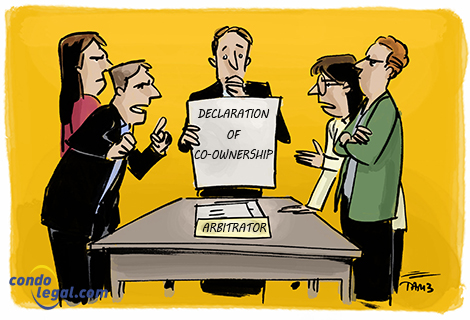 Co-ownership conflicts often arise from a lack of knowledge of the rules governing the immovable, a lack of communication or transparency, or from an unresolved misunderstanding.
Co-ownership conflicts often arise from a lack of knowledge of the rules governing the immovable, a lack of communication or transparency, or from an unresolved misunderstanding.
Know that in such cases, a trial is not the only avenue available to you. Before commencing legal proceedings, and even once they are engaged, and even once they are initiated, there is always time to opt for the services of a mediator. The latter, who is a neutral and impartial third party, could help you resolve (without decision-making power) a dispute between a co-owner and the syndicate or members of the board of directors between them.
Voluntary process
Mediation is a voluntary participatory process of dispute resolution. It is governed by articles 1 to 7 and 605 to 619 of the Code of Civil Procedure. A neutral and impartial mediator leads the process. He is not called upon to rule on the dispute - as a judge or an arbitrator would - nor to impose any decision whatsoever. Rather, his role is to facilitate communication and negotiations between the parties, by advocating a constructive approach, so that they can find a solution to their conflict. It is all predicated upon a mutual understanding of the problem to resolve it and eventually reach an agreement.
Modus operandi
The mediator is chosen by the parties by mutual agreement, directly or through a third party. Before starting the mediation session, the mediator informs the parties about their rights and duties. In particular, it informs them about the voluntary nature of the mediation, the documents to be signed at the beginning of the mediation, the confidentiality and the duration of the mediation process.
During this stage, the facts, arguments and needs of the parties are considered. As the mediation progresses, solutions are proposed, until the parties involved reach an agreement. The mediator then prepares a mediation agreement. This agreement, which does not have the enforceability of a judgment, is confidential and must reflect the wishes of the parties. It is predicated on the goodwill of the parties involved, unless it is decided that it constitutes a transaction. This transaction (between the parties) has henceforth the authority of res judicata and will be susceptible of forcible execution as soon as it has been homologated by the court.
Presence of lawyers
The parties may be assisted by their own lawyer in the preparation and conduct of a mediation session. The lawyer must understand the respective position of the parties and be constructive and imaginative in developing possible avenues for resolving the conflict. It must not antagonize the parties. His role is to appease his client by considering all the dimensions of the conflict, not only legal, but also human and psychological. Mediation in the presence of lawyers experienced in co-ownership law is extremely beneficial as it guarantees both parties quality independent legal advice.
Declaration of co-ownership
Some declarations of co-ownership include a mediation clause. They usually require co-owners and directors to submit their dispute to a mandatory mediation process. It is generally provided that the mediator is a lawyer or notary with experience in the field of co-ownership.
In principle, the parties cannot resort to the courts, as long as they have not gone through the process. In many cases, a clause provides that if mediation fails, the parties will go to arbitration, which concludes with a final and non appealable decision. Thus, using the courts is in principle no longer possible.
However, filing an application to the courts is not excluded in all cases. It should be noted that a mediation clause properly drafted provides that any litigation involving a small claim ($ 15,000 or less) remains subject to the jurisdiction of the Small Claims Division of the Court of Québec. In such cases, the parties must first attempt to settle their dispute through mediation. But if the talks are unsuccessful, they can go directly to this court without submitting to arbitration.
If the declaration of co-ownership does not provide for an alternative dispute resolution process, it is always possible to include it in the declaration of co-ownership, by the means of an amendment at the occasion of its partial or complete rewrite.
Benefits of mediation
Mediation has many advantages over traditional litigation before the courts. It often leads to the resolution of a conflict. For example, mediation can:
Prerequisites for mediation
The parties entering into mediation are required to participate in good faith. They must actively cooperate in finding a solution and agree to compromise on their respective requests.
Application for an Injunction
Before entering into mediation, and possibly arbitration, a litigant may (in certain circumstances) apply to the Superior Court of Quebec for a provisional injunction to prevent irreparable harm. Such an order will thus preserve its rights, if its rights are in jeopardy, although it must nevertheless submit to mediation and ultimately to arbitration.
Mediation and its limits
Mediation is not a panacea for resolving all disputes. For example, a syndicate seeking an order to prevent a co-owner from carrying work in a common portion will not achieve this result using mediation, and also if it had to compel a co-owner to comply with a provision of the by-laws of the immovable in the declaration of co-ownership; it should rather enforce the penal clause to impose the fines stipulated therein. The syndicate could also resort to the courts to get a final ruling on the application of the law, by setting a enforceable precedent for the parties.
Watch out for prescription (statute of limitation)
Moreover, it is important to keep in mind that, like any other means used to settle a dispute - other than through legal proceedings or arbitration - mediation does not interrupt extinctive prescription (statute of limitation). Remember that the holder of a right, that fails to act within the delays, is at risk of having prescription invoked as a defence to have the application dismissed. However the parties may agree to waive prescription already acquired and the benefit of time elapsed in a signed document to suspend prescription for the duration of the mediation process, without however such suspension lasting more than 6 months.
 WHAT YOU SHOULD KNOW! Mediation is a private dispute prevention and resolution process that guarantees full control of the conflict by the parties. It deals with the crux of the dispute, usually caused by a breakdown in communication. Unlike a trial or arbitration where a third-party rules on the dispute and imposes a solution, mediation ensures, throughout the whole process, that nothing can be decided without the agreement of the parties.
WHAT YOU SHOULD KNOW! Mediation is a private dispute prevention and resolution process that guarantees full control of the conflict by the parties. It deals with the crux of the dispute, usually caused by a breakdown in communication. Unlike a trial or arbitration where a third-party rules on the dispute and imposes a solution, mediation ensures, throughout the whole process, that nothing can be decided without the agreement of the parties.
 WHAT TO KEEP IN MIND: Mediation is an informal process by which an impartial third party (the mediator), who has no decision-making power, assist the parties to find an acceptable solution. This type of conflict management is intended to make better use of our courts.
WHAT TO KEEP IN MIND: Mediation is an informal process by which an impartial third party (the mediator), who has no decision-making power, assist the parties to find an acceptable solution. This type of conflict management is intended to make better use of our courts.
 WARNING! All disputes have peculiarities. It is thus advisable to put the odds on your side by choosing a mediator whose training, approach and experience can make a difference. In co-ownership, it is preferable that the prospective candidate be an expert in the field.
WARNING! All disputes have peculiarities. It is thus advisable to put the odds on your side by choosing a mediator whose training, approach and experience can make a difference. In co-ownership, it is preferable that the prospective candidate be an expert in the field.







